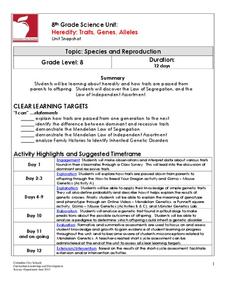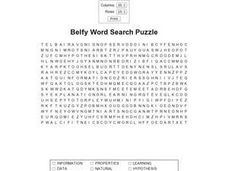University of Kentucky
Beneficial Bug Scavenger Hunt
Many people think of bugs as annoying pests to be squashed, but most insects and spiders are beneficial, eating the actual pests or pollinating plants. After reviewing some of the common bugs in your area (they may differ from those...
Curated OER
What Do Koalas Need to Survive?
First graders take a field trip and examine the Koala and his habitat. In this Koala instructional activity, 1st graders read Possum Magic and discuss the foods of Australia. Students view the habitat of a Koala and record...
Cal Recycle
Conserving Natural Resources
Trying to plan an engaging elementary science unit on natural resources? Conserve your energy! This five-part series of lessons and hands-on activities has exactly what you need to teach young scholars about the importance of conservation.
Scholastic
Recovery From Drug Addiction
Are there factors that put some individuals at a higher risk for drug addiction than others? Learn more about the risk factors that may make some people more susceptible to addiction, as well as protective factors that help prevent...
Curated OER
Giant Smelly Plant Attracts Thousands
Read and discuss a news article about a rare corpse plant that bloomed in Washington D.C. Because this native Indonesian plant blooms so rarely, people flock to see it. After reading the article, your class answers comprehension...
Redefining Progress
Have and Have-Not
Is there a correlation between a country's wealth and the extent of its ecological footprint? What exactly constitutes an ecological footprint, and how does one country stack up against the rest? This is a unique lesson to incorporate...
Montana State University
One Mountain, Many Cultures
Americans may think of Mount Everest as a region dedicated to adventurous hikers, but many cultures have flourished there! Learners read informative books, watch videos, participate in classroom discussion, analyze folk tales, and...
Columbus City Schools
It’s All Relative
Are the people on the other side of the world standing upside down? Pupils discuss the relationship between movement and position words. The unit explores the concept of reference points through animation, modeling, photography, and...
Virginia Department of Education
Weather Patterns and Seasonal Changes
Get your class outside to observe their surroundings with a lesson highlighting weather patterns and seasonal changes. First, learners take a weather walk to survey how the weather affects animals, people, plants, and trees during...
Wildlife World Zoo & Aquarium
Puzzled About Conservation
Raise children's awareness about conservation with this series of vocabulary activities. Offering riddles about endangered species and a crossword puzzle involving key terms relating to conservation, these fun worksheets will...
Royal BC Museum
Kids Page - Whales
Read about the physical features of whales and how they are grouped according to their method of eating food. A neat activity is described on the page; consider carrying this out in class. The resource makes a nice addition to a lesson...
Rainforest Alliance
Colombia Biodiversity
How diverse is the rainforest? How much more diverse is a rain forest than a temperate forest? Explore these focus questions in a lesson that explores the plants, animals, and insects in forests. After listening to a reading...
US National Library of Medicine
Science and Society: Preventing the Spread of Disease
Looking for a valuable resource on the spread of infectious diseases? Here is a instructional activity in which pupils simulate the spread of diseases and learn about how to prevent them from spreading. Class members read case studies...
Columbus City Schools
Heredity: Traits, Genes, Alleles
If you knew people would pay extra for a bald dragon, could you pick which parents you should breed in order to get the highest number? The unit examines heredity and genetics through breeding dragons, mice, dogs, and tries to figure...
American Museum of Natural History
What's the Big Deal About Water?
It may seem simple, but water is one of the most unique substances on Earth. An interactive online lesson describes its properties and importance in so many different situations. Learners interact with the lesson to learn the role water...
Chymist
How Do We Affect the Quality of Our Atmosphere
Explore the makeup of the earth's atmosphere. Using the set of specific experiments, pupils examine the main elements and compounds present in the atmosphere. Their study extends to investigate the effects of atmospheric...
Curated OER
Does It Move On It's Own?
Young scientists look at drawings of six animals, then match up a word that describes how they move. The words are: hop, crawl, swim, fly, run, and jump. They also answer two additional questions about the animals and how they move. A...
Curated OER
Insects and Bugs
Students recognize the difference between insects and bugs while making connections to personal experiences. In this insect and bug lesson, students complete a pre-assessment to demonstrate prior knowledge, then gather information...
TED-Ed
The Colossal Consequences of Supervolcanoes
The threat posed by super volcanoes is explored in a short video that reviews the destruction caused by Mount Tambora in 1815 and by Peru's Huaynaputina in 1600. Think it can't happen again? The narrator contends that the explosive...
Curated OER
Reinforcement: Physical and Chemical Changes
A simple assignment that reviews physical and chemical changes with your physical science pupils. They fill in the blanks in a paragraph about each. In addition, they list three examples of each. Without a word bank, it may prove...
Curated OER
Worksheet 4. Reading: Pliny Describes Elephants
In this reading comprehension worksheet, learners read the passage titled Pliny Describes Elephants. They then answer the 7 multiple choice questions about the reading.
Curated OER
Belfy Word Search
In this language arts worksheet, students study 20 words in a word bank, then locate them in a word search puzzle. The words appear to be related to chemistry but the meaning of the title is not known.
US Environmental Protection Agency
Building an Model Aquifer
With almost half of Americans relying on groundwater supplies, it is more important than ever to protect aquifers from possible contaminants. Working in small groups, young environmentalists explore this problem as they create an aquifer...
Curated OER
Is the Hudson River Too Salty to Drink?
Students explore reasons for varied salinity in bodies of water. In this geographical inquiry lesson plan, students use a variety of visual and written information including maps, data tables, and graphs, to form a hypothesis as to why...























